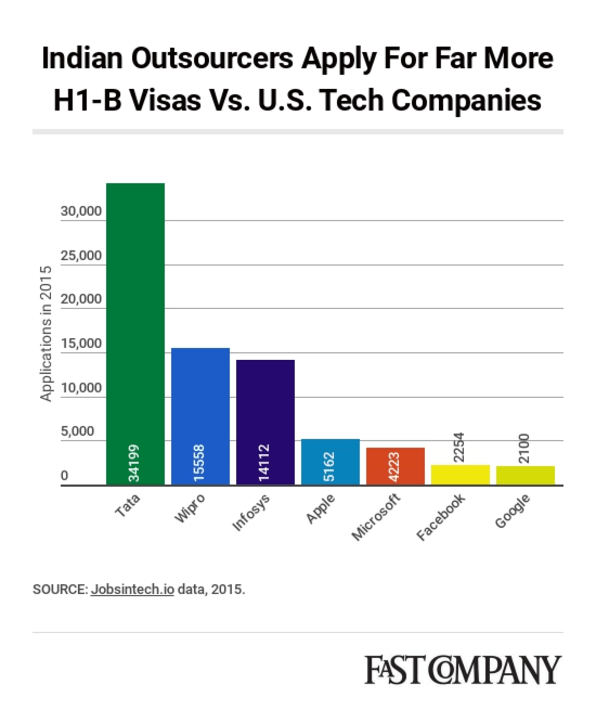To Really Reform The H-1B Visa Process Will Take A Lot More Than Friday’s Freeze
The move by the U.S. Citizenship and Immigration Services (USCIS) on Friday to suspend “premium” processing of H-1B visas puts the issue of high-tech worker immigration reform back in sharp focus. Big tech companies routinely pay the $1,225 fee to get a decision on an applicant’s work visa in weeks instead of months. This adds to the thousands in attorneys’ fees that sponsor companies pay to navigate the tricky and unforgiving legal waters of the H-1B application process.
The suspension, which takes effect on April 3, appears to be President Trump’s attempt to begin fulfilling his campaign promise to curb H-1B abuse, wherein companies recruit foreign (mostly Indian) skilled workers for lower salaries than they’d have to pay American workers. And it comes just after Senator Dick Durban released a statement calling on the White House to follow through on its H-1B reform campaign promises. But the USCIS’s move on Friday seems more like a small administrative tweak than the precursor to real reform.
USCIS says that it’s suspending premium processing for administrative reasons, as a way of speeding up H-1B applications generally.
“This on its own makes no sense; the (premium processing) program has been working well, and it’s been effective for the better part of a decade,” says immigration attorney David Leopold, who routinely represents U.S. companies seeking visas for foreign IT workers. “There’s simply no rational reason for it, except for political reasons.” Leopold is former president of the American Immigration Lawyers Association.
“It’s only because of the agency’s inefficiency that we need this to begin with,” Leopold says. “Companies need this, they need premium processing to get their business done.”
Speeding up the application process is important, but it’s just a small part of the problem. The main issue is that companies, foreign and domestic, are gaming the system as a way to hire cheap labor at the expense of U.S. workers.
Several bills have already been introduced in the new Congress to reform the H-1B system, two of them from Rep. Darrell Issa (R-CA) and Rep. Zoe Lofgren (D-CA) both of whom represent Silicon Valley districts.
But there may be no simple legislative fix to H-1B abuse—though increasing funds for enforcement (bigger government) would likely help.
The government issues 85,000 H-1B visas each year, with 20,000 of them reserved for foreign grad students studying in the U.S. The number of applications always dwarfs the supply of visas, so the government uses a lottery system to distribute them.

But the lion’s share of the H-1B visas get swallowed up by Indian labor outsourcing firms like Tata Consulting Services and Infosys. These companies hire IT and engineering talent in India and send them to the U.S. to work in the U.S., H-1B visas in hand.
Lawmakers are concerned that U.S. companies shift work to the outsourcing firm contractors as a way to save money, even as (more expensive) U.S. workers are available. Some lawmakers, like Issa, believe that imposing a minimum yearly salary requirement (in Issa’s bill, $100,000) for the foreign workers might remove the incentive for the skilled labor arbitrage game that some U.S. companies have played using the Indian outsourcing companies.
That might do some good in places like New York and San Francisco, one expert tells me, but might do more harm in other places.
“If you live in San Francisco or New York, $100,000 might be barely enough to get by,” said work visa expert Theo Negri. “But what if you’re in Nebraska where you can live well on $50,000? It doesn’t seem fair to require that the company to pay twice that much.” Negri runs the Jobsintech.io website, where employers can post H-1B jobs in the U.S.
Negri says the key is to make sure that employers, including the outsourcing companies, pay the “prevailing wage” for a given position, or more. In fact, the USCIS requires it. Almost all of the H-1B jobs listed on Jobsintech.io list salaries that are at or above the prevailing wage. The H-1B jobs posted by U.S. companies like Apple and Facebook are all well above the prevailing wage.
The same can also be said of lower-paid job listings by Indian outsourcing companies, which illustrates how the program has been exploited. Those outsourcers use a different way to post jobs with lower salaries, Negri says. Since the “prevailing wage” is based on the job title, the outsourcing companies often make up their own titles for the positions. So a highly skilled software development position might instead be advertised as a “technology lead” role. Using such a generic job title, Negri says, the outsourcers can set the salary at whatever they want.
Still, those lower-wage jobs are often snatched up, because for the predominantly Indian workers who take the positions, the salaries are still far more than what they’d make at a similar job in their home country, Negri said. Sounds like a win-win for employers and workers, except for those Americans with similar levels of experience who might be beaten out of a job by foreign workers who will work for less. Or those Americans could be booted out of the jobs they currently have. At least 400 IT workers at Southern California Edison were laid off last year and replaced by workers from India, some of whom they had reportedly trained for their new roles.
The Indian outsourcing companies consider H-1B reform a material threat to their businesses. And when Indian leaders met with Trump last week, they expressed their concerns about changes proposed to the program. In its most recent 10-Q filing, Infosys stated: “Anti-outsourcing legislation in certain countries in which we operate, including the United States and the United Kingdom, may restrict companies in those countries from outsourcing work to us, or may limit our ability to send our employees to certain client sites.”
Infosys declined to comment for this story.
American companies like Apple and Microsoft hire a certain amount of H-1B visa workers every year, but not nearly as many as the outsourcing firms. Those tech giants have a harder time seeing into the future to know how many H-1B workers they might need during the coming year. So they sometimes bring foreign employees to the U.S. on a temporary work visa, Negri says, then gamble that the employee can get an H-1B visa when the lottery opens up again the following April.
In comparison, the outsourcing firms know they will need contractors during the year, so they file for thousands of H-1Bs when the application period opens April 1. Demand for the workers recruited by the outsourcing firms to work at U.S. companies is high and fairly predictable.
“You should not be able to get 80% of the total number of visas,” Negri says. “In what world should a company that produces nothing—they’re just consulting companies—be able to get that many visas? It’s not like they are Google or Facebook—companies that actually make real products.”
And yet, as the outsourcing companies have argued in court, they are not breaking the law by vacuuming up all the H-1B visas. Well, not the letter of the law, in any case. There’s no law saying that U.S. companies must use U.S. natives as employees, and no law prescribing how many H-1B visas any one sponsor company can receive.
Negri believes the outsourcing companies go further than just flooding the system with applications. “People have been cheating the system for a long time,” he told me.
The outsourcing companies, for instance, sometimes try to bring employees to the U.S. with the wrong kind of visa, like a J1 temporary visa, Negri says. The J1 is meant to bring researchers, professors, and exchange students to the U.S. to promote “cultural exchange.” But the J1 can get a foreign person into the country for a year while the sponsor company works to get the employee a proper H-1B, which can be used for six years.
That’s just one technique. Negri says there are many others. “Where there’s a will, there’s a way.” Gaming the system is part of the outsourcing companies’ business model, he claims. The potential cost of fines from getting caught is built into their business model as a risk factor. If the outsourcers beat the system more than they lose, they’re happy.
David Leopold would not comment on the visa practices of the Indian “job shops” (they are not among his clients), but he would say that it’s often the case that he can’t get one of his client companies an H-1B visa for an employee simply because there are none left.
There may be too many ways to game the system to fix it all with a new federal law. And, Leopold points out, H1-B visa are already the most regulated of all the temporary visas.
“The Department of Labor has their requirements in it, the USCIS has their requirements in it,” he says. “It’s already company-specific, employee-specific, salary-specific, venue-specific . . . In many ways it’s not a great visa; it’s expensive and full of red tape.”
“What we need is more enforcement,” Negri says. U.S. agencies may need new funding and new powers to monitor H-1B visas on a case by case basis.
This isn’t asking too much, Negri notes. When you remove the graduate students, we’re only talking about 65,000 visas. Asking the Labor Department to monitor 65,000 people out of 300 million people living in the U.S. isn’t asking the impossible.
“Companies should be made to play it more straight in getting visas,” Negri says. “and if you get caught cheating there should be real consequences.”
Fast Company , Read Full Story
(35)














